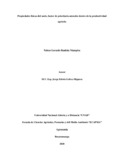Please use this identifier to cite or link to this item:
https://repository.unad.edu.co/handle/10596/36739Full metadata record
| DC Field | Value | Language |
|---|---|---|
| dc.contributor.advisor | Gelvez Higuera, Jorge Edwin | - |
| dc.coverage.spatial | cead_-_bucaramanga | spa |
| dc.creator | Bautista Niampira, Nelson Gerardo | - |
| dc.date.accessioned | 2020-10-11T05:47:49Z | - |
| dc.date.available | 2020-10-11T05:47:49Z | - |
| dc.date.created | 2020-10-09 | - |
| dc.identifier.uri | https://repository.unad.edu.co/handle/10596/36739 | - |
| dc.description.abstract | La producción agrícola depende en gran medida de suelos óptimos, tradicionalmente dentro del análisis de la calidad de un suelo, se tienen en cuenta sus propiedades químicas, los nutrientes son los que garantizan el desarrollo óptimo de la planta, sin embargo, se deja de lado las propiedades físicas del suelo, variable de gran importancia y que junto con los factores biológicos, facilitan una adecuada germinación, desarrollo y producción de la planta. Las propiedades físicas del suelo, tienen que ver con su estructura, las partículas que lo conforman, y que son el resultado de procesos evolutivos en cada ambiente particular donde las encontremos, en su creación intervienen aspectos como el clima, el relieve, la humedad relativa y otras variables que condicionan estas propiedades y que permiten la formación de suelos y horizontes con condiciones particulares. Conocer cada una de las propiedades físicas del suelo, permite al productor tener la capacidad de identificar sus particularidades, comprender la interacción que puede darse entre el suelo y las plantas y adicionalmente lo orienta sobre la toma de decisiones y las prácticas de manejo adecuadas que favorezcan su conservación y sostenibilidad en el tiempo. | spa |
| dc.format | ||
| dc.title | Propiedades físicas del suelo, factor de prioritaria atención dentro de la productividad agrícola. | |
| dc.type | Monografia | |
| dc.subject.keywords | Suelo, Densidad, Permeabilidad, Consistencia, Productividad, Agrícultura. | spa |
| dc.description.abstractenglish | Agricultural production depends to a large extent on optimal soils, traditionally within the analysis of the quality of a soil, its chemical properties are taken into account, the nutrients are those that guarantee the optimal development of the plant, however, it is left aside the physical properties of the soil, a variable of great importance and which, together with the biological factors, facilitate an adequate germination, development and production of the plant. The physical properties of the soil, have to do with its structure, the particles that make it up, and which are the result of evolutionary processes in each particular environment where we find them, aspects such as climate, relief, relative humidity intervene in its creation and other variables that condition these properties and that allow the formation of soils and horizons with particular conditions. Knowing each of the physical properties of the soil, allows the producer to have the ability to identify its particularities, understand the interaction that can occur between the soil and plants and additionally guides him on decision-making and appropriate management practices that favor its conservation and sustainability over time. | spa |
| dc.subject.category | Agronomía | spa |
| Appears in Collections: | Agronomía | |
Files in This Item:
| File | Description | Size | Format | |
|---|---|---|---|---|
| ngbautistan.pdf | 704.65 kB | Adobe PDF |  View/Open |
Items in DSpace are protected by copyright, with all rights reserved, unless otherwise indicated.
